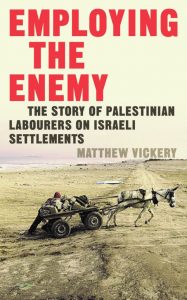Employing the enemy: The story of Palestinian labourers on Israeli Settlements

Living with shame: The dilemmas facing Palestinian workers in the settlements
reviewed by JFJFP signatory David Sperlinger, December 2017. Zed Books, 2017
This short but disturbing book explores the apparently puzzling contradiction that many of the Israeli settlements on the West Bank rely on employing large numbers of Palestinians for their farms, industries and even for their construction.
The book is divided into two sections. The first, which is particularly powerful, focuses mainly on the stories of individual Palestinians and shows the enormous pressures (social, financial and psychological) that employment in the settlements creates for them. If you want to understand something of the day-to-day experience of the Occupation on the lives of ordinary Palestinians, then this book provides a good place to start.
The second part of the book has a wider aim and tries to understand the employment of Palestinians in the settlements in the broader context of Israeli policies towards the Palestinians generally and of the specific practices of the Occupation on the everyday lives of the Palestinians.
Some of the basic facts that Vickery describes in the first part of the book are shocking in themselves, even without the added layer provided by the individual stories. For example, it is estimated that 20,000 – 30.000 Palestinians are legally employed in the settlements, of whom it is (conservatively) estimated that 80% are paid less than the minimum wage stipulated by Israeli laws. (They are, in theory, covered by those laws, as confirmed in a High Court of Justice ruling in 2007, which the Israeli government had strongly disputed.)

Palestinian labourers working in a settlement
In addition, many thousands of workers are working without a permit and are almost always paid even less than those with a permit. These “illegal” workers must also avoid checkpoints on their way to work, resulting for many in long and hazardous journeys – facing the risk of being shot or arrested if caught by soldiers. Even for those workers with a permit the journey to work can be demanding, with long queues outside the settlement and frequent humiliating treatment and searches.
One of the most disturbing chapters in the book describes the situation of the hundreds of children (illegally) employed in the settlements, some as young as 11. Vickery talks to one 14-year old, Zacharia, who says:
Last month the tractor drove over my foot. (…) My father had to take me to hospital, the farmer didn’t care. He just told me I can phone my father. (…) My father had to pay all the hospital fees. (…) The settler doesn’t care. (…) We have no rights, no insurance. To be honest the work affects me, it’s hard, I don’t like it, it makes me depressed. But I have nothing else, it’s the only place I can work, and my family need me to help out.
This vignette captures many of the common threads in the stories in this book: the ways in which the settler employers evade the employment laws that should apply to the Palestinian workers (in terms of low pay, the lack of adequate health and safety arrangements, the absence of sickness payments or compensation for injuries, the absence of proper contracts, etc.); the callous inhumanity with which the workers are treated; the sense for the Palestinians that they are trapped and have no choice but to work on the Settlements, which they hate and which causes them a sense of shame for supporting the Occupation.
